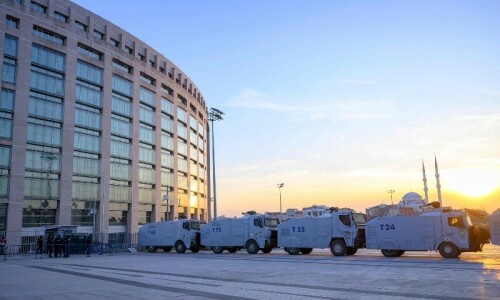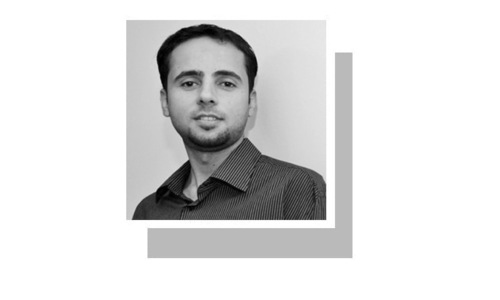KARACHI: As the country opens after months of lockdown, more and more people are coming out of their homes without face masks and under the illusion that the Covid-19 pandemic is over. The Independence Day celebrations across the country were proof enough that the citizens have thrown caution and social distancing to the wind.
Health experts warn that foregoing safety measures will lead to a jump in infection rates and urged the people to wear face masks, particularly in situations where social distancing is not possible, stressing that careless attitude of the public can lead to another spike.
As per the data shared on the government’s Covid-19 portal, there are 16,261 total active cases in the country on Aug 15, confirmed case numbers are 288,047, 6,182 Pakistanis have lost their lives due to coronavirus while 265,624 have recovered.
Face masks were made mandatory in the country on May 31 for crowded places, mosques, bazaars, shopping malls and public transport including buses, trains and planes. In July, at a meeting of the National Command and Operation Centre (NCOC), it was stressed that wearing masks and compliance with standard operating procedures (SOPs) by the public were the only measures to contain Covid-19 outbreak in the country.
However, a visit to the city’s main markets shows the advice was either not heard or forgotten. People roam around without any face masks as they bump into each other on overcrowded sidewalks. Some shopkeepers might have a surgical or fabric mask dangling from one ear or placed under the chin. The situation is no different at public and private offices where masks are mandatory for entry but once inside, the coverings are often left on desks.
Majority of the people all across the country have stopped wearing face masks outside their home
Sources from Lahore, Peshawar, Quetta and many cities and towns shared similar opinions.
Most say it is too hot and uncomfortable to wear a mask. Many feel the pandemic is over, many more feel that “coronavirus was nothing more than a hoax”.
“Cases have gone down thankfully but the public needs to wear masks and follow SOPs. People have mingled a lot during Eidul Azha and the impact will be visible in the next week. Muharram is coming up. This laidback attitude will complicate things,” said Dr Shireen Khan, the head of tuberculosis and chest diseases department at the Fatimah Jinnah Hospital in Quetta.
Dr Khan, who has been named as one of the recipients of Sitara-i-Imtiaz for his efforts against coronavirus in Balochistan on Aug 14, said Covid-19 numbers had gone down because there was a coordinated response and restrictions were in place but another peak was likely if people were careless.
A similar experience was shared by Dr Muhammad Adil, the focal person of Covid-19 at Lahore’s Mayo Hospital. He said that the case numbers had gone down but the “risks have not”.
He too stressed that people must wear masks in public settings. Along with hand hygiene, masks provide an added layer of protection. People touch their nose and mouth subconsciously. Wearing a mask means that you don’t end up touching your nose or mouth directly,” he said.
The World Health Organisation (WHO) notes that the “use of masks is part of a comprehensive package of the prevention and control measures that can limit the spread of certain respiratory viral diseases, including Covid-19”.
“Masks can be used either for protection of healthy persons [worn to protect oneself when in contact with an infected individual] or for source control [worn by an infected individual to prevent onward transmission]. However, the use of a mask alone is insufficient to provide an adequate level of protection or source control, and other personal and community level measures should also be adopted to suppress transmission of respiratory viruses,” the WHO said.
What type of masks?
Dr Khan and Dr Adil both advised that surgical masks were ideal but fabric masks were okay too. They stressed that the public should leave the N-95 masks for medical workers.
“Masks prevent saliva and respiratory secretions and droplets from reaching other people. They also protect the wearer against secretions of others. So infections like Covid-19 can be blocked from getting from one person to another. Use of masks is an effective strategy to block disease transmission,” a representative of the Medical Microbiology and Infectious Diseases Society Pakistan (MMIDSP) told Dawn.
The society said children should also wear fabric masks when out in public and once schools reopen. “This would protect them and also block them from taking it to their families. Along with fabric masks, good hand hygiene must also be practiced at all times.”
The Centres for Disease Control and Prevention (CDC) in Atlanta, USA, advise that people wear masks in public settings when around people outside of their household, especially when other social distancing measures are difficult to maintain.
The spread of Covid-19 can be reduced when masks are used along with other preventive measures, including social distancing, frequent hand-washing, and cleaning and disinfecting frequently touched surfaces. The masks recommended here are not surgical masks or respirators.
“The purpose of masks is to keep respiratory droplets from reaching others to aid with source control. Masks with one-way valves or vents allow exhaled air to be expelled out through holes in the material. This can allow exhaled respiratory droplets to reach others and potentially spread the Covid-19 virus. Therefore, CDC does not recommend using masks if they have an exhalation valve or vent,” the CDC says on its website.
Eating out and travelling
In the country’s northern areas, tourists have been coming out in droves. “A strict policy of ‘No mask, no stay’ has been implemented,” said Khyber Pakhtunkhwa Tourism Secretary Abid Majeed.
Till last month, Mr Majeed was heading the relief and rehabilitation department of KP that was working on Covid-19.
“We are ensuring that the ‘masks on’ policy is strictly implemented in the province so that local population and tourists are both safe,” he added.
Health experts said masks and social distancing was very important when it came to travelling and dining out.
“Open spaces are fine with social distancing but enclosed spaces pose a risk. If an infected person stays in an air-conditioned restaurant for a long time, there is a real risk of infecting others. Take away and delivery are still the best option. If staying in a hotel have your meals in the room or in an open space,” the MMIDSP added.
While the public stays away from masks, many politicians have been sporting masks for a while now. Punjab Chief Minister Usman Buzdar and PPP chairman Bilawal Bhutto-Zardari have been wearing masks in public.
Some of those at the top wear masks, but somehow the message fails to trickle down to their followers.
Special Assistant to the Prime Minister on Health Dr Faisal Sultan tweeted on Aug 12: “Covid-19 in Pakistan is down but NOT out and it can spread again if we abandon caution and care. Please wear masks — especially in indoor and crowded situation. A simple measure to protect ourselves and our country!”
The next day Prime Minister Imran Khan was seen wearing a mask at the inaugural ceremony of the BRT in Peshawar, one of the few occasions in the recent past.
In a video statement, Sindh Health Minister Azra Fazal Pechuho urged that people follow SOPs and wear masks. “The lockdown has been lifted keeping in mind the financial situation of the people but Covid-19 has not gone away,” she said, her face covered in a mask.
Published in Dawn, August 16th, 2020
















































